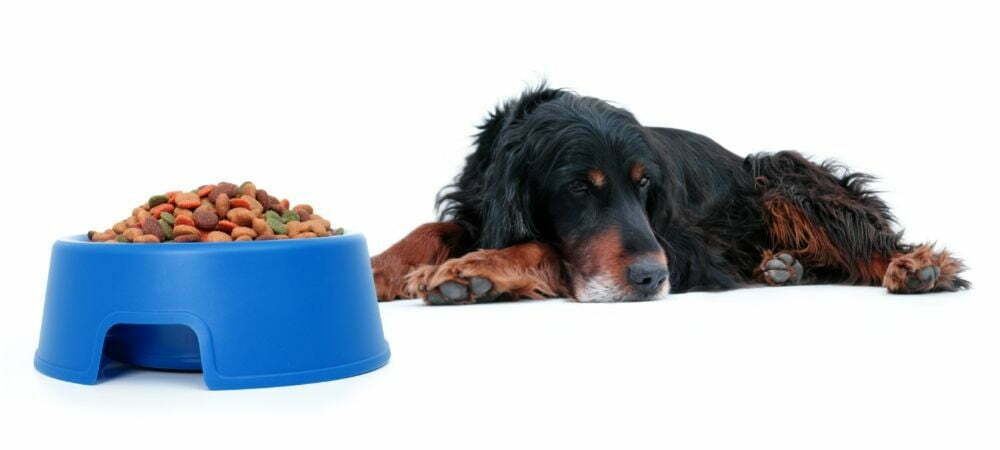
If you think your dog may be suffering from symptoms of acid reflux, you should try to identify what’s causing the problem as soon as possible. This will allow you to get your dog the best treatment and make sure he’s feeling back to normal in no time. So, what is acid reflux?
Acid reflux, also known as gastroesophageal reflux, occurs in dogs when the contents of the stomach and intestines flow backward. It’s not always easy to prevent, and it can occur at any time.
A momentary opening of the sphincter leading from the esophagus to the stomach, along with a reverse flow of the gastrointestinal tract, will likely cause your dog to throw up.
Common Symptoms of Acid Reflux in Dogs Include:
- Regurgitation – This happens due to the stomach contents flowing backward and up the esophagus. If this regurgitation persists and a dog does not eat enough calories and nutrients from the food you’re giving him, he will begin losing weight- and fast.
- Throwing-up bile – The yellow substance found in our empty stomachs is called bile. It normally travels through the stomach and into the intestines, but if a dog suffers from acid reflux, he may cough it up.
- Decreased appetite – A dog may seem disinterested in food if he is suffering from acid reflux. Treats and meals that would normally excite him don’t appeal to him anymore.
- Pain when Swallowing – If your dog does manage to eat some food, he may show some visible signs of discomfort when eating and swallowing it. Some very hungry dogs will fight through this pain and keep eating.
Symptoms of acid reflux in dogs can be managed with medications and dietary restrictions, but if it is caused by a hiatal hernia, surgery may be required. Food is usually restricted for a couple of days before a low-fat, low-protein diet is delivered in shorter, frequent intervals throughout the day.
Apart from instances where the dog requires surgery, most treatments can be administered at home by the owner.
What do you feed a dog with acid reflux?
Softer dog foods are the best option if your dog is prone to acid reflux. Soft foods reduce the amount of effort their digestive enzymes have to put in to digest their meal. This is a particularly helpful solution for any dog with a poor digestive tract.
One of the key components to boosting your dog’s general health and reducing the chances of acid reflux is simple- he needs a well-balanced diet. Allergen, preservative-rich, oily, or spicy foods might upset a dog’s stomach and should be avoided, especially if he’s feeling unwell.
It’s also crucial to avoid giving your dog too many table scraps as a reward or feeding them bad human food, as this might upset their stomach even more.
You should avoid feeding your dog anything late at night, especially if he’s suffering from acid reflux. This is because the esophageal sphincter relaxes during sleep. So, a dog that has eaten late at night is more likely to vomit when they wake up.
Feeding your dog small meals regularly can also lessen the chances of them vomiting bile, which occurs most often on an empty stomach. Larger meals might put too much strain on the digestive system, so feeding your dog several times a day may help to minimize acid reflux symptoms.
When switching dog food, always make sure to gradually transition from the old food over to the new. This is especially important for dogs with acid reflux and other gastrointestinal issues.

Is Pepcid or omeprazole better for dogs?
If your dog is suffering from acid reflux, there are a number of medications that can help to ease the symptoms. Two of the most common medications administered for acid reflux in dogs include Pepcid (famotidine) and omeprazole (Prilosec).
Recent studies carried out on both cats and dogs show that omeprazole is more effective than Pepcid at treating the symptoms of acid reflux. This is why omeprazole (Prilosec) is often the medication of choice for stomach and intestinal ulcers in dogs.
When compared to famotidine, omeprazole is thought to be a more effective medication. Omeprazole has a longer half-life in the body, with effects that become stronger over time. Famotidine does not have this cumulative effect. Omeprazole, on the other hand, may have more negative side effects connected with its use.
Famotidine and omeprazole are not the same types of drug, therefore they are not interchangeable. Despite the fact that they’re both used to treat the same gastrointestinal issues, they are not the same medication.
Omeprazole is a PPI and famotidine is an H2 blocker. This means that each drug will have a slightly different effect on your dog. Before administering medication you should seek expert veterinarian advice.
What is the best antacid for dogs?
The most common antacids used to treat acid reflux in dogs are omeprazole and Pepcid. However, there are many different medications that are often used to treat gastrointestinal problems in dogs. Here’s a rundown of those medications:
Ranitidine (Zantac)
This is typically used for stomach ulcers, and to treat internal inflammation, and reduce stomach acidity by inhibiting the H2 receptor. The H2 receptor is responsible for sufficient histamine release.
Sucralfate (Antepsin)
This medication attaches to proteins excreted at ulcer/inflammatory sites and provides protection from the stomach acid.
Omeprazole (Prilosec)
This is a proton pump inhibitor that reduces the amount of gastric acid. Whilst it is often considered the most effective medication for reflux, it does not agree with every dog and is not suitable for long-term use.
Metoclopramide
This medication is a gastrointestinal prokinetic agent that improves the movement of stomach contents through the intestines and also helps to strengthen the gastroesophageal sphincter.
Antibiotics
If a bacterial infection is present, antibiotics are usually administered. These can only be prescribed by a veterinarian after an accurate diagnosis.
Probiotics
These can aid in neutralizing gut bacteria and are beneficial in the treatment of a variety of digestive problems (except for acute pancreatitis). More research is certainly needed, but gut bacteria are often linked to stress management, and probiotics may help with both the cause and the effect of reflux.
